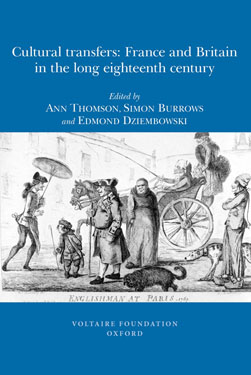Cultural transfers
France and Britain in the long eighteenth century
Volume: 2010:04
Series: SVEC
Volume Editors: Ann Thomson, Simon Burrows and Edmond Dziembowski
Series Collaborators: Sophie Audidière, Université Paris VIII; Pierre-Yves Beaurepaire, Université de Nice Sophia-Antipolis / Membre de l'Institut Universitaire de France; Simon Burrows, University of Leeds; Emmanuelle de Champs, Universite Paris VIII; Joanna Craigwood, University of Cambridge; Claire Crignon-De Oliveira, Université de Bourgogne; Mark Curran, University of Leeds; Jean-François Dunyach, Université Paris IV - Sorbonne; Edmond Dziembowski, Université de Franche-Comté; Elizabeth Grist, Queen Mary University of London; Rachel Hammersley, University of Newcastle; Stéphane Jettot, Université Paris IV - Sorbonne; Charles-Edouard Levillain, Université de Lille 2; James Livesey, University of Sussex; Pierre Lurbe, Université de Rennes II; Michel Malherbe, Université de Nantes; Mariana Saad, Queen Mary University of London; Delphine Soulard, Université de Provence, Aix-Marseille I; Ann Thomson, Université Paris 8.
Publication Date: 2010
Pages: 338
ISBN: 978-0-7294-0993-3
Price: £75

About
Cultural transfers between eighteenth-century France and Britain did much to shape the intellectual identity of each nation. But what were the main channels of communication? How did they function? What was their impact?
In Cultural transfers: France and Britain in the long eighteenth century a team of specialists focuses on the networks and correspondences on which these exchanges were based, the concrete form they took and the material, political or ideological constraints which governed them. Particular attention is paid to the roles of:
• intermediaries such as diplomats, scientific institutions, or the Huguenot exiles who played a crucial part in disseminating English scientific, theological and political writings
• gazettes, learned periodicals, and government-sponsored journals where the French learned about British political debates and institutions
• translators, who could significantly alter texts in line with their own preconceptions and agendas or the expectations of their readers
This multidisciplinary book moves beyond the classic concern with ‘influences’ of one author or culture on another. It presents a new understanding of the hidden international networks that sustained the Republic of Letters and of the synthesis that emerged through contacts and interaction between French and British culture.
Ann Thomson and Simon Burrows, Introduction
I. Correspondence and networks
Rachel Hammersley, The ‘Real Whig’– Huguenot network and the English Republican tradition
Elizabeth Grist, Pierre Des Maizeaux and the Royal Society
Charles-Édouard Levillain, La correspondance diplomatique dans l’Europe moderne (c.1550-c.1750): problèmes de méthode et tentative de définition
Joanna Craigwood, Diplomats and international book exchange
Pierre-Yves Beaurepaire, Quand les francs-maçons signent des traités diplomatiques: circulations et échanges maçonniques entre France et Angleterre (1765-1775)
James Livesey, London by the light of Montpellier: scientific networks between Britain, northern Europe and the Languedoc (1706-1789)
Mariana Saad, Le réseau franco-britannique du Recueil Duquesnoy
Jean-François Dunyach, Les réseaux d’un excentrique: vies et parcours de William Playfair (1759-1823)
II. Journalism
Claire Crignon-de Oliveira, Le rôle des périodiques dans la diffusion du savoir médical en France et en Grande-Bretagne (fin dix-septième – dix-huitième siècle)
Delphine Soulard, Les journalistes du Refuge et la diffusion de la pensée politique de John Locke auprès du public francophone dès la fin du dix-septième siècle
Ann Thomson, In defence of toleration: La Roche’s Bibliothèque angloise and Mémoires littéraires de la Grande-Bretagne
Edmond Dziembowski, Le peuple français instruit: Edme-Jacques Genet et la traduction des écrits politiques britanniques pendant la guerre de Sept Ans
Simon Burrows, The Courier de l’Europe as an agent of cultural transfer (1776-1791)
III. Translation
Stéphane Jettot, La compréhension et la traduction des débats parlementaires à Londres par les diplomates de Louis XIV
Ann Thomson, Des Maizeaux, Collins and the translators: the case of Collins’ Philosophical inquiry concerning human liberty
Pierre Lurbe, Traduire, trahir, se trahir: le cas du Pantheisticon de John Toland
Michel Malherbe, Hume en France: la traduction des Political discourses
Mark Curran, The Société typographique de Neuchâtel and networks of trade and translation in eighteenth-century francophone Europe
Emmanuelle de Champs, An introduction to utilitarianism: early French translations of Bentham’s Introduction to the principles of morals and legislation
Reviews
Quinzaine littéraire
Il est impensable que par sa richesse, sa valeur documentaire et ses avancées méthodologiques ce livre ne suscite pas des vocations.
Modern Language Review
Scholars expect the highest standards of scholarship to appear in SVEC volumes. This collection will by no means disappoint. It will be invaluable to all researchers working in the field of cross-Channel exchanges, and of great interest to dix-huitiémistes more generally.
French Studies
the contributions draw our attention to a fascinating range of concrete instances situated in the nooks and crannies of cultural history that form the inner life of the macro-history of cultural transfers and development. This collection of articles constitutes a valuable contribution to the field of comparative and interdisciplinary studies of European history of ideas and cultural development.
We use cookies to help give you the best experience on our website. By continuing without changing your cookie settings, we assume you agree to this. Please read our cookie policy to find out more. more information
The cookie settings on this website are set to "allow cookies" to give you the best browsing experience possible. If you continue to use this website without changing your cookie settings or you click "Accept" below then you are consenting to this.


